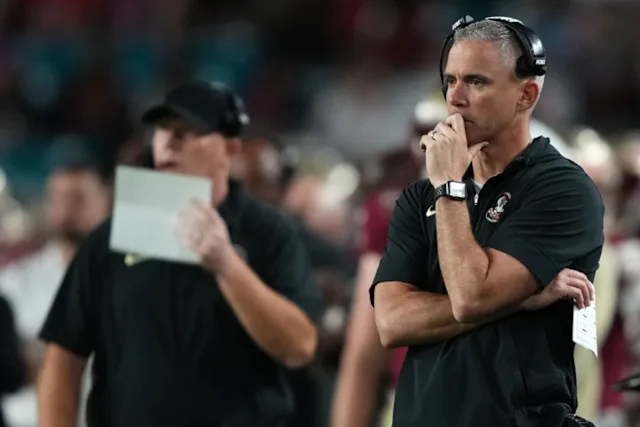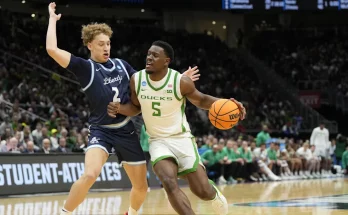The Florida State University football program, long celebrated for its rich history and competitive spirit, has recently found itself under intense scrutiny following a tumultuous 2024 season that left fans, analysts, and conference rivals questioning the efficacy of its recruiting efforts. The season’s disappointing results have cast a shadow over the Seminoles’ once-promising trajectory, prompting critics—most notably an influential ACC coach—to voice concerns about whether the program’s recruiting strategies are keeping pace with the evolving landscape of college football. As the sport continues to grow more competitive and talent acquisition becomes increasingly vital to sustained success, the implications of these questions extend far beyond a single season, touching on the very foundation of FSU’s future ambitions.
The 2024 campaign was supposed to be a turning point for Florida State, marking a resurgence after years of inconsistency. Expectations were high, fueled by a talented roster, a new coaching staff, and a renewed sense of purpose within the program. However, the season quickly unraveled as the Seminoles struggled to find stability on both sides of the ball, finishing with a record that fell well below preseason projections. Losses piled up against conference rivals and non-conference opponents alike, exposing vulnerabilities that had previously been masked by flashes of brilliance. The team’s inability to close out tight games, coupled with offensive struggles and defensive lapses, painted a stark picture of systemic issues that extended well beyond game-day execution.
While on-field performance naturally garners immediate attention, the root causes of a team’s struggles often lie in the recruiting pipeline. Recruiting is the lifeblood of college football; it determines not only the talent level on the roster but also the future depth and versatility of the team. In recent years, FSU had made concerted efforts to elevate its recruiting profile, targeting top-tier high school prospects and leveraging its storied history to attract talented athletes. However, the results of the 2024 season have led some observers to question the effectiveness of these efforts. Critics argue that the program may have overestimated its ability to land elite prospects consistently, especially as other programs within the ACC and nationally have accelerated their recruiting initiatives.
One ACC coach, speaking on condition of anonymity, voiced pointed concerns about Florida State’s recruiting approach. They suggested that while FSU has historically been a powerhouse, its recent recruiting classes haven’t matched the standard required to compete at the highest levels. The coach emphasized that recruiting is a continuous cycle, demanding not only the ability to identify top talent but also the capacity to develop that talent effectively once on campus. The implication was that FSU might be falling behind in one or both of these areas, which could explain the recent on-field struggles.
Critics note that during the 2024 cycle, Florida State’s recruiting classes appeared to lack the consistency and star power seen in their rivals’ efforts. While the Seminoles managed to secure some promising prospects, they failed to land several key targets that other programs in the ACC and beyond prioritized. This discrepancy could be attributed to various factors, including coaching staff changes, recruitment strategy execution, or even the program’s shifting priorities. Some speculate that the coaching staff’s focus may have been diverted toward immediate roster improvements rather than long-term development, resulting in a pipeline of talent that is not as robust or versatile as needed to sustain a winning culture.
Furthermore, the coach pointed out that recruitment is not solely about signing high school stars; it also involves effective player development, retention, and creating a competitive environment that fosters growth. If Florida State’s recent recruiting classes are not translating into on-field success, questions naturally arise about whether the coaching staff is maximizing the potential of the players they do bring in. Developmental bottlenecks, lack of clear strategic direction, or insufficient emphasis on player conditioning and scheme fit could all contribute to a disconnect between recruiting efforts and on-field results.
The impact of these recruiting concerns is compounded by the rising competitiveness of the ACC. Traditional powerhouses like Clemson and Miami have continued to strengthen their recruiting efforts, often securing top national prospects and building depth that allows them to sustain success over multiple seasons. Meanwhile, FSU appears to be at a crossroads—either stepping up its recruiting game to match or surpass its rivals or risking further stagnation. The ACC coach’s criticisms suggest that the Seminoles need to reevaluate and possibly overhaul their recruiting philosophy to stay relevant in a league that is becoming increasingly talent-rich and competitive.
Another layer to the discussion involves the broader landscape of college football recruiting. The sport has seen an influx of NIL (Name, Image, Likeness) opportunities, transfer portal activity, and social media influence, all of which have reshaped how programs attract and retain players. Florida State’s ability to adapt to these changes could determine whether it regains its foothold as a recruiting powerhouse. Critics argue that if FSU has not kept pace with the evolving recruiting landscape—particularly in leveraging NIL opportunities and the transfer portal—it may find itself at a disadvantage against programs that have embraced these strategies more aggressively.
The transfer portal, in particular, has become a game-changer in recent years, allowing programs to fill immediate needs and add experienced players mid-season. Florida State’s efforts in this arena have been mixed, with some successful transfers bolstering specific positions but perhaps not enough to cover systemic deficiencies. The 2024 season’s struggles may reflect a team that is still in transition, trying to blend high school recruits with transfer additions while developing a cohesive identity.
In response to these concerns, the Florida State administration and coaching staff are likely under pressure to adapt and address the perceived deficiencies. This may involve reevaluating recruiting priorities, expanding staff dedicated to scouting and player development, or innovating new ways to attract top prospects. The importance of building a sustainable pipeline cannot be overstated; programs that consistently recruit well and develop their players tend to sustain success over multiple seasons. Conversely, those that fall behind often find it difficult to regain momentum without significant strategic changes.
Ultimately, the questions raised by the ACC coach highlight a broader truth about college football: success is cyclical and requires a delicate balance of recruiting, development, strategic execution, and adaptation to a rapidly changing landscape. Florida State’s recent struggles serve as a wake-up call that no program—regardless of history or tradition—can rest on its laurels. If the Seminoles are to return to national prominence and reclaim their standing as a formidable force in the ACC, they will need to address these recruiting concerns head-on, investing in comprehensive strategies that ensure they attract, develop, and retain top-tier talent.
The road ahead is challenging, but it also presents an opportunity for Florida State to learn from its setbacks and implement meaningful changes. The criticism from an ACC coach, while pointed, could serve as a catalyst for renewed focus and innovation within the program. As college football continues to evolve, programs that prioritize recruiting excellence alongside player development stand the best chance of achieving sustained success. Whether FSU can rise to meet these challenges remains to be seen, but the scrutiny underscores the importance of aligning recruiting efforts with long-term strategic goals. If the Seminoles can do so, they might well silence critics and restore their reputation as one of college football’s premier programs.



